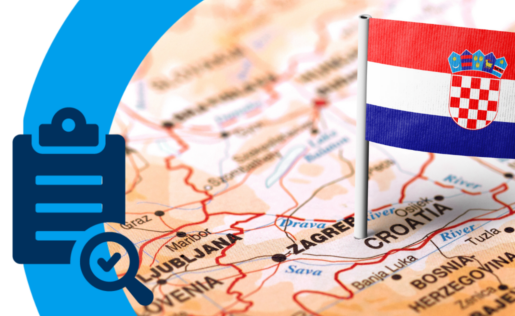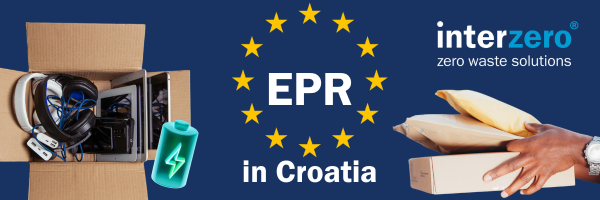New Extended Producer Responsibility Register (EPRR) in Croatia
Unkategorisiert

Starting in 2025, all companies that put products that generate special categories of waste on the Croatian market are required to register in the new Extended Producer Responsibility Register (EPRR). This electronic database, developed by Fina for the Environmental Protection and Energy Efficiency Fund, will contain key information on producers obliged to comply with the Waste Management Act.
From January 2025, registration in EPRR will be exclusively digital, replacing previous methods. All producers, both existing and new, must register during this month.
EPRR Data:
The register includes data on product types and quantities placed on the market, along with information on fulfilling waste management obligations. A particular focus lies on Ordinance on packaging and packaging waste, single-use plastics, and fishing gear containing plastic and the Ordinance on the management of special waste categories in the system of the Fund.
Access to EPRR:
Access to the EPRR will be provided only to authorised users through the National Identification and Authentication System (NIAS) – (https://nias.gov.hr/), which will require credentials of a minimum significant level of security. If you are a foreing producer with registration and reporting obligations, only your authorized representative in Croatia will have access and can register your company.
Registration and Fee Obligations:
Registration and fee obligations apply to producers of the following products placed on the Croatian market:
- Beverage and milk packaging (0.2 l to 3 l)
- Various product packaging
- Disposable plastic products (bags, containers, wrappers, wipes, balloons, etc.)
- Tobacco products with filters
- Fishing gear containing plastic
- Electrical and electronic devices and equipment
- Tires
- Vehicles
- Lubricating oils
- Batteries and accumulators
Data for products placed on the Croatian market in January 2025 must be submitted in February 2025 exclusively via the EPRR form.
Interzero Support:
Interzero will continue to act as an authorized representative, managing all obligations for foreign companies delivering products subject to the Waste Management Act to end consumers in Croatia.
Further Information:
Detailed information is available on the website of the Fund for Environmental Protection and Energy Efficiency.
Who needs an authorized representative for EPR obligations in the Republic of Croatia?
Unkategorisiert

This guide provides a comprehensive overview of Extended Producer Responsibility (EPR) in Croatia, helping businesses understand their obligations and navigate the system.
Changes to EPR Legislation in Croatia
Croatia recently implemented significant updates to its EPR regulations for packaging, WEEE (Waste Electrical and Electronic Equipment), batteries, and other products. These changes, effective November 2023, aim to align Croatia with EU standards and promote sustainable waste management.
Key Changes:
Packaging Regulations:
- Fully implements EU Packaging and Single-Use Plastics Directives.
- Defines new producer responsibilities, including web platforms.
- Requires foreign companies to appoint authorized representatives.
- Introduces a mandatory deposit system for single-use beverage packaging.
- Establishes new rules for deposit labels.
- Mandates financing for anti-littering measures, prohibits lightweight plastic bags, and promotes beverage cup consumption reduction.
Regulation on Special Waste Management:
- Maintains most existing EPR requirements for WEEE and batteries.
- Requires producers of automotive and industrial batteries to cover full end-of-life financing.
- Imposes EPR obligations on web platforms.

Who is considered a producer?
It is important to define that the producer means the producer of products that are placed on the market in the Republic of Croatia, regardless of the sales method, using remote communication, that sells EE equipment, B&A (portable B&A as stand-alone products) directly to households or non-household users in the Republic of Croatia, and has its business headquarters in another EU member state or a third country. But the obligation to authorize an authorized representative in the Republic of Croatia has only foreign producers if they sell directly to a natural person, to a citizen (household or B2C) via online. Others can fulfill their obligations by themselves, but they can also be supported in actions when help is needed.
Producers have an obligation to register and submit data to The Extended Producer Responsibility Register (EPRR). Management fee is calculated based on that data and paid monthly for the quantity of products that the producer put on the market in the territory of the Republic of Croatia in the previous month. In order to implement the obligation, the producer (or in the case of foreign company its authorized representative) is obliged to calculate and pay the management fee to the account of the Fund.
The obligations of the AR are unchanged, and they include fulfilling the EPR obligations of the producer or the platform in accordance with the Ordinance, communication with the Fund, management fee, and monitoring The Extended Producer Responsibility Register.
Until now, data registration and reporting for packaging, batteries, and accumulators took place quarterly, but starting from 1st of January 2025, packaging will also be reported monthly, as was the case with EE equipment so far.
Understanding EPR Policy
The OECD defines EPR policies as those that:
Shift Responsibility Upstream: Producers, not municipalities, take on the financial and logistical burden of waste management for their products.
Incentivize Sustainable Design: Producers are encouraged to consider environmental impacts throughout the product lifecycle, promoting eco-design and resource efficiency.
Which products are subject to EPR obligations in Croatia?
Croatia has established the system for the management of special categories of waste, which is managed by the Fund, but we will focus on three core categories:
- WEEE (Waste Electrical and Electronic Equipment): High volume and often contain toxic components.
- Packaging: Significantly contributes to waste streams.
- Batteries: Contain hazardous materials and require specialized handling.
These categories pose environmental risks when improperly disposed of.
Who Needs to comply with these obligations?
Any business that manufactures, imports, sells, or brand-owns products or packaging covered by EPR regulations can be considered a producer. Companies meeting any of these criteria must review EPR legislation in every country they operate in to ensure compliance. In the Republic of Croatia the obligation to appoint an authorised representative only falls upon companies delivering their products through distance selling systems (online platforms) to citizens.
Additionally, some countries may have thresholds, such as minimum turnover or product quantities, that determine if a business is subject to EPR obligations.
In Croatia, the threshold is one product of packaging /batteries /electronic devices placed on the market.
Navigating Compliance with Interzero
Interzero, a global waste management and recycling leader, offers expertise in EPR compliance across Europe. With over 30 years of experience and an international team, we can help your business understand its EPR obligations in Croatia. Contact us today if you need further guidelines how to comply with your obligations. We will be happy to help!
